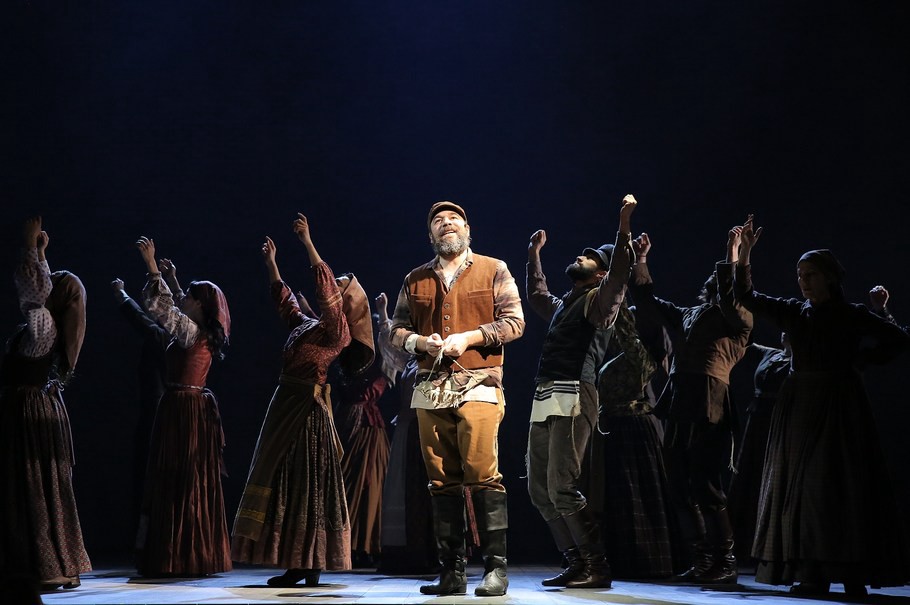What Pop Culture Teaches Us About Money: “Fiddler On The Roof”
The iconic musical is a Jewish take on “Pride & Prejudice”

I can’t believe I didn’t see it before. I can’t believe I didn’t realize. It was only last night, when Ben surprised me with tickets to the Broadway revival of the classic American show “Fiddler on the Roof,” that I got the very evident parallels between it and Jane Austen’s classic British novel “Pride & Prejudice.” How are these two unrelated pieces of pop culture alike? Let me count the ways.
- A poor family has five daughters. In both cases, the story begins the same way, by introducing us to a family with few means but an abundance of girls.
- The father has a sense of humor; the mother is more or less a shrew. But, as others have pointed out before me, with cause.
- In any case, Mom & Dad don’t get along. Poverty can put real stress on relationships!
- The fate of the family, in large part, hinges on whether the older daughters can marry well.
- Hijinks ensue when the daughters want to marry for love, not money. And in both cases, one of the younger daughters causes real trouble when she runs away with the fellow of her choice.
There’s a lot that’s different, too. Austen’s romantic comedy is set in England during the Napoleonic Wars; the Boch-Harnick tragicomedy, based on the writings of Sholem Aleichem, is set almost 100 years later in Czarist Russia. The Bennets, while cash-strapped, are genteel landowners with servants; Tevye’s family is actually poor. Most notably, Austen’s protagonists get a happy ending — in fact, several. Tevye’s family gets an avalanche of bad luck that culminates in their being evicted from their home altogether and forced to emigrate to America.
The Bennets fear the worst. Tevye’s family experiences the worst.
Watching the show for the first time as a grown up, I was fascinated by how terrifying it is. From the beginning, Tevye’s yukking it up, joking to God like you would to some guy who was texting back at first but has since ghosted — we can call this phenomenon Holy Ghosting, perhaps? — and I think it’s easy to read the show as a vehicle for laughs with some sentiment, and later some real sadness, mixed in.
I experienced it as horror from the very first song. “Tradition!” sings the ensemble, which is apparently the Yiddish word for “patriarchy.” The lyrics explain that, for girls, that means something very simple. “And who does Mama teach / to mend and tend and fix / preparing me to marry / whoever Papa picks? / The daughters!” I mean, no one in this show has a life to aspire to, but that is a seriously grim prospect. At least the men get to be, or pretend, they’re in charge. As we go on to learn in even more grim detail in “Matchmaker,” the girls have no agency at all. “‘He’ll beat you every night! / But only when he’s sober, so you’re all right,’” sings Tzeitel to her younger sisters, doing an impersonation of the village matchmaker describing a chosen groom. She’s trying to get them to understand that being married off is a chilling fate, not an enviable one, and boy do they get it.
The book of the show, written by Joseph Stein, gets in plenty of smart, wry jokes about money. In “If I Were A Rich Man,” Tevye sings about being approached to give advice, and adds, “It won’t make one bit of difference / if I answer right or wrong. / When you’re rich, they think you really know.” When Perchik, the young radical, tells him money is a curse, Tevye roars, “May the Lord smite me with such a curse! And let me never recover!” There’s plenty of fatalism to go around, too. “And if our good fortune never comes, here’s to whatever comes,” sing the men in the bar. They know that, however rich they may get or happy they may feel, they have no real control over their fates: their non-Jewish countrymen can swarm them with impunity, ransacking their weddings and, later, taking their land.
Partly my reaction of “yikes!” is attributable to the production I saw, which does a better job than the movie does of lending a historically appropriate ominousness to the proceedings. But I also think that a sense of dread and impending disaster is right there for anyone who chooses to look.
All of us Billfolders have personal experiences with “Fiddler.” Mike played Muttel the Tailor when he was a kid. Nicole used to pretend with her sister that they were the girls from the show. And I played Tzeitel, as I once discussed with Nicole in a Friday Chat.
Sympathy For The Devil, i.e. Lydia Bennet And Amy March: A Friday Chat
My next step is to engage with the source material, since I’ve heard a lot about Sholem Aleichem’s stories but never read them. Meanwhile, what are your memories of “Fiddler”? Basically Austen-meets-Kubrick, or am I overreacting?
Support The Billfold
The Billfold continues to exist thanks to support from our readers. Help us continue to do our work by making a monthly pledge on Patreon or a one-time-only contribution through PayPal.
Comments